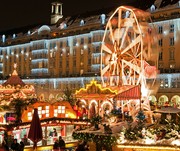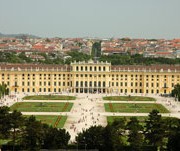Top 5 Christmas markets in Germany and Austria
Christmas markets have been taking place in Europe for centuries, and still attract thousands of visitors each year
They are particularly magical in Germany and Austria and are one of the few festivities surrounding Christmas that remain relatively traditional. In an age where some people associate the start of the Christmas period with the first appearance of the festive John Lewis ad on tv, it’s fantastic that the essence of European Christmas markets remains. The majority of stalls continue to sell only food and drink, or traditional arts and crafts such as wooden Christmas decorations and hand-made toys.
There are markets in many towns and cities across Europe, but some of the best known and most visited include those in Cologne, Munich, Vienna, Dresden and Heidelberg. Cactus offers German courses in many of these cities, and taking a course at this time of year will not only enable you to enjoy the festivities first hand, it will also give you a fantastic insight into German culture and tradition.
1. Cologne Christmas Market
Every year, the city centre of Cologne is transformed into a festive wonderland when the seven Christmas markets in this lively city open for visitors. Thousands of people from around the world descend to enjoy the music, arts, food and the traditional gifts sold in the specially designed huts (or “Buden”). The largest and popular of these is the market ‘Am Dom’, located on the square in front of the famous cathedral, reputedly the most visited monument in Germany.
Besides shopping at the Christmas markets, the city also offers an extensive programme of exhibitions, shows and concerts, full details of which can be found at on this Cologne website.
Cologne Christmas Market Dates: 24 November – 23 December 2014
2. Munich Christmas Market
The main component of the Christmas market in Munich, Bavaria’s capital city, is held at the famous Marienplatz, in the heart of the old town. There are a number of smaller markets dotted around the city too, including one in the English Gardens and a medieval Christmas market where costumed candle makers, glass blowers and blacksmiths show off their skills.
Visitors can also experience the lively atmosphere of the Tollwood Winter Festival, located on the Oktoberfest grounds at Theresienwiese. Alongside the stalls offering traditional goods and delicious local foods is an extensive array of live shows and performances to enjoy.
The market begins on the Friday before the first Advent, when over 140 stands are set up, and thousands gather in the square to watch the giant Christmas tree illuminated for the first time.
Munich Christmas Markets Dates: 27 November – 24 December 2014
3. Vienna Christmas Market
The ‘Christkindlmarkt’ that is held on the square in front of the Vienna’s beautiful Town Hall is the city’s best-known Christmas market, although there are plenty more dotted around the Austrian capital. It is one of the most visited in Europe, and is also one of the oldest, dating back over seven hundred years. It also starts early, so if you want to enjoy some festive cheer early on in the season, and beat the crowds, Vienna is the place to go!
Another of the highlights at this time of year is the market held in front of the beautiful Schönbrunn Palace, which you can peruse with the accompaniment of traditional carol singing.
Vienna Christmas Markets Dates: 21 November – 23 December 2014
4. Heidelberg Christmas Market
Heidelberg’s Christmas market extends over five of the city’s main squares. Heidelberg has got to be one of the most romantic and fairytale-esque cities in Germany, which also adds to its appeal at this time of year. Browsing the hundreds of stalls, you’ll enjoy lovely views of the castle and the old town, with its attractive decorations and ancient cobbled streets. As with many of the places in Germany at this time of year, you may even get a dusting of snow to enhance the view!
A recent attraction at the Heidelberg Christmas market is also the “Christmas on Ice” situated on Karlsplatz.
Heidelberg Christmas Market Dates: 24 November – 22 December 2014
5. Dresden Christmas Market
Dresden’s Christmas Market holds the accolade of being the oldest in Germany, and it is said to date back to the 15th century. The market is known locally as the ‘Striezelmarkt’, and takes its name from the ‘Striezel’ or Stollen, a sweet fruitcake that is the city’s most famous culinary creation.
The annual highlight of the Christmas market is the Stollen Festival on the second Sunday during advent season, when a giant Stollen cake is carried to the market and ceremonially sliced and distributed among onlookers. This ritual is said to date back to the 16th century, when the local Stollen bakers would present cakes to the local prince, carrying them ceremoniously through the town to the castle, where the prince would cut them and hand out pieces to the poor.
There are many other markets to be found around the city, including some in the stable yards at Residenzschloss and others in the former village centre of Loschwitz, each of them with their own attractions.
Dresden Christmas Market Dates: 27 November – 24 December 2014


